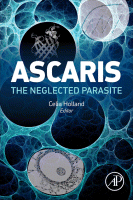Browse content
Table of contents
Actions for selected chapters
- Full text access
- Book chapterNo access
Index
Pages 427-439
About the book
Description
This book tackles a number of different perspectives concerning the parasitic helminth Ascaris, both in animals and in humans and the disease known as ascariasis. It seeks to identify interesting, exciting and novel aspects, which will interest readers from a broad range of disciplines.
Over a quarter of the world's population are infected with the human roundworm, and the equivalent in pigs is equally ubiquitous. Both contribute to insidious and chronic nutritional morbidity, and this has been quantified, in humans, as disability adjusted life years approximating 10.5 million. Ascaris larvae develop in host parenteral tissues, and the resultant pathology has been condemnation. Ascariasis, despite its staggering global prevalence and the sheer numbers of people it infects, remains a classic neglected disease. However, renewed interest in the consequences of early infection with worms from the perspective of immune modulation, co-infections and the development of allergy further enhances the relevance of these parasites.
This book tackles a number of different perspectives concerning the parasitic helminth Ascaris, both in animals and in humans and the disease known as ascariasis. It seeks to identify interesting, exciting and novel aspects, which will interest readers from a broad range of disciplines.
Over a quarter of the world's population are infected with the human roundworm, and the equivalent in pigs is equally ubiquitous. Both contribute to insidious and chronic nutritional morbidity, and this has been quantified, in humans, as disability adjusted life years approximating 10.5 million. Ascaris larvae develop in host parenteral tissues, and the resultant pathology has been condemnation. Ascariasis, despite its staggering global prevalence and the sheer numbers of people it infects, remains a classic neglected disease. However, renewed interest in the consequences of early infection with worms from the perspective of immune modulation, co-infections and the development of allergy further enhances the relevance of these parasites.
Key Features
- Brings together a wide range of topics and approaches and recent, comprehensive and progressive research concerning the neglected parasite Ascaris
- Provides a blueprint of how a single parasite entity can stimulate interest in basic biology, clinical science, veterinary science, public health and epidemiology
- Presents a wealth of new insights given that a book on this parasite has not been published for over 20 years
- 16 chapters from a range of top authors from around the world
- Brings together a wide range of topics and approaches and recent, comprehensive and progressive research concerning the neglected parasite Ascaris
- Provides a blueprint of how a single parasite entity can stimulate interest in basic biology, clinical science, veterinary science, public health and epidemiology
- Presents a wealth of new insights given that a book on this parasite has not been published for over 20 years
- 16 chapters from a range of top authors from around the world
Details
ISBN
978-0-12-396978-1
Language
English
Published
2013
Copyright
Copyright © 2013 Elsevier Inc. All rights reserved.
Imprint
Academic Press
